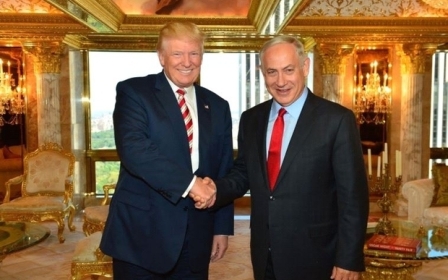Israel's top court hears petitions to bar Netanyahu from forming government
Ruling against Netanyahu would likely trigger snap election, fourth since April 2019, as country grapples with coronavirus crisis and its economic fallout

Israeli protesters watch Supreme Court deliberations broadcast live on giant screen outside Knesset (parliament) in Jerusalem on Sunday (AFP)
Published date: Dimanche 3 mai 2020 - 19:17
|
Last update: 4 années 6 mois ago
Israel's top court on Sunday began hearing arguments to bar Prime Minister Benjamin Netanyahu from forming a new government as he faces a criminal trial on corruption charges.
The Supreme Court will also hear petitions challenging a coalition deal with his rival-turned-partner Benny Gantz, who is currently speaker of the Knesset, Israel's parliament, AFP said.
Middle East Eye propose une couverture et une analyse indépendantes et incomparables du Moyen-Orient, de l’Afrique du Nord et d’autres régions du monde. Pour en savoir plus sur la reprise de ce contenu et les frais qui s’appliquent, veuillez remplir ce formulaire [en anglais]. Pour en savoir plus sur MEE, cliquez ici [en anglais].




